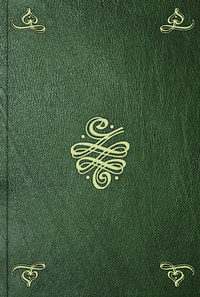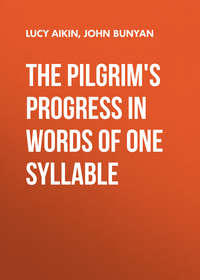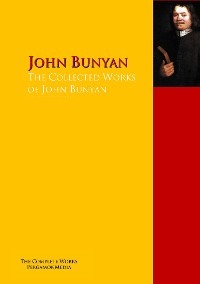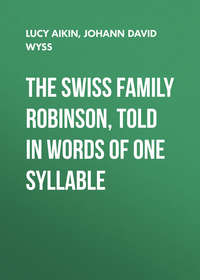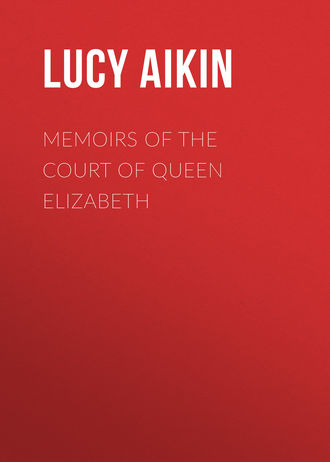 полная версия
полная версияMemoirs of the Court of Queen Elizabeth
...."Against contempt, if there be any, which I will never believe, let your excellent virtues of piety, justice and liberality, daily, if it be possible, more and more shine. Let such particular actions be found out (which be easy, as I think, to be done) by which you may gratify all the hearts of your people. Let those in whom you find trust, and to whom you have committed trust, in your weighty affairs, be held up in the eyes of your subjects: Lastly, doing as you do, you shall be as you be, the example of princes, the ornament of this age, and the most excellent fruit of your progenitors, and the perfect mirror of your posterity."
Such had ever been the devoted loyalty of Philip Sidney towards Elizabeth, and so high was the place which he held in her esteem, that she appears to have imputed the boldness of this letter to no motives but good ones; and instead of resenting his interference in so delicate a matter, she is thought to have been deeply moved by his eloquence, and even to have been influenced by it in the formation of her final resolve. But far other success attended the efforts of a different character, who labored with equal zeal, equal reason, and probably not inferior purity of intention, though for less courtliness of address, to deter rather than dissuade her from the match, on grounds much more offensive to her feelings, and by means of what was then accounted a seditious appeal to the passions and prejudices of the nation.
The work alluded to was entitled "The discovery of a gaping gulf wherein England is like to be swallowed by another French marriage, if the Lord forbid not the banns by letting her see the sin and punishment thereof." Its author was a gentleman named Stubbs, then of Lincoln's Inn, and previously of Bene't College Cambridge, where we are told that his intimacies had been formed among the more learned and ingenious class of students, and where the poet Spenser had become his friend. He was known as a zealous puritan, and had given his sister in marriage to the celebrated Edmund Cartwright the leader of the sect. It is probable that neither his religious principles nor this connexion were forgotten by the queen in her estimate of his offence. A furious proclamation was issued against the book, all the copies of which were ordered to be seized and burned; and the author and publisher, being proceeded against on a severe statute of Philip and Mary, which many lawyers held to be no longer in force, were found guilty, and condemned to the barbarous punishment of amputation of the right hand.
The words of Stubbs on being brought to the scaffold to undergo his sentence have been preserved, and well merit transcription. "What a grief it is to the body to lose one of his members you all know. I am come hither to receive my punishment according to the law. I am sorry for the loss of my hand, and more sorry to lose it by judgement; but most of all with her majesty's indignation and evil opinion, whom I have so highly displeased. Before I was condemned, I might speak for my innocency; but now my mouth is stopped by judgement, to the which I submit myself, and am content patiently to endure whatsoever it pleaseth God, of his secret providence, to lay upon me, and take it justly deserved for my sins; and I pray God it may be an example to you all, that it being so dangerous to offend the laws, without an evil meaning, as breedeth the loss of a hand, you may use your hands holily, and pray to God for the long preservation of her majesty over you, whom God hath used as an instrument for a long peace and many blessings over us; and specially for his Gospel, whereby she hath made a way for us to rest and quietness to our consciences. For the French I force not; but my greatest grief is, in so many weeks and days of imprisonment, her majesty hath not once thought me worthy of her mercy, which she hath often times extended to divers persons in greater offences. For my hand, I esteem it not so much, for I think I could have saved it, and might do yet; but I will not have a guiltless heart and an infamous hand. I pray you all to pray with me, that God will strengthen me to endure and abide the pain that I am to suffer, and grant me this grace, that the loss of my hand do not withdraw any part of my duty and affection toward her majesty, and because, when so many veins of blood are opened, it is uncertain how they may be stayed, and what wilt be the event thereof.".... The hand ready on the block to be stricken off, he said often to the people: "Pray for me now my calamity is at hand." And so, with these words, it was smitten off, whereof he swoonded85."
In this speech, the language of which is so remarkably contrasted with those abject submissions which fear extorted from the high-born victims of the tyranny of Henry VIII., the attentive reader will discern somewhat of the same spirit which combated popery and despotism under the Stuarts, though tempered by that loyal attachment towards the restorer and protectress of reformed religion which dwelt in the hearts of all the protestant subjects of Elizabeth without exception.
After the execution of the more painful part of his sentence, Stubbs was further punished by an imprisonment of several months in the Tower: but under all these inflictions, his courage and his cheerfulness were supported by a firm persuasion of the goodness of the cause in which he suffered. He wrote many letters to his friends with the left hand, signing them Scævola; a surname which it was his pleasure to adopt in memory of a circumstance by which he did not feel himself to be the person dishonored. Such was the opinion entertained by Burleigh of the theological learning of this eminent person and the soundness of his principles, that he engaged him in 1587 to answer Cardinal Allen's violent book entitled "The English Justice;" a task which he is said to have performed with distinguished ability.
During the whole of the year 1580, the important question of the queen's marriage remained in an undecided state. The court of France appears to have suffered the treaty to languish, and Elizabeth, conscious no doubt that her fond inclination could only be gratified at the expense of that popularity which it had been the leading object of her policy to cherish, sought not to revive it. Various circumstances occurred to occupy public attention during the interval.
Sir Nicholas Bacon, who under the humbler title of lord keeper had exercised from the beginning of the reign the office of lord high chancellor, died generally regretted in 1579. No one is recorded to have filled this important post with superior assiduity or a greater reputation for uprightness and ability than sir Nicholas, and several well-known traits afford a highly pleasing image of the general character of his mind. Of this number are his motto, "Mediocria firma," and his handsome reply to the remark of her majesty that his house was too little for him;—"No, madam; but you have made me too big for my house." Even when, upon this royal hint, he erected his elegant mansion of Gorhambury, he was still careful not to lose sight of that idea of lettered privacy in which he loved to indulge; and the accomplishments of his mind were reflected in the decorations of his home. In the gardens, on which his chief care and cost were bestowed, arose a banqueting-house consecrated to the seven Sciences, whose figures adorned the walls, each subscribed with a Latin distich and surrounded with portraits of her most celebrated votaries; a temple in which we may imagine the youthful mind of that illustrious son of his, who "took all learning to be" his "province," receiving with delight its earliest inspiration! In his second wife,—one of the learned daughters of sir Anthony Cook, a woman of a keen and penetrating intellect, and much distinguished by her zeal for reformed religion in its austerer forms,—sir Nicholas found a partner capable of sharing his views and appreciating his character. By her he became the father of two sons; that remarkable man Anthony Bacon, and Francis, the light of science, the interpreter of nature; the admiration of his own age, and the wonder of succeeding ones; the splendid dawn of whose unrivalled genius his father was happy enough to behold; more happy still in not surviving to witness the calamitous eclipse which overshadowed his reputation at its highest noon.
The lord keeper was esteemed the second pillar of that state of which Burleigh was the prime support. In all public measures of importance they acted together; and similar speculative opinions, with coinciding views of national policy, united these two eminent statesmen in a brotherhood dearer than that of alliance; but in their motives of action, and in the character of their minds, a diversity was observable which it may be useful to point out.
Of Burleigh it has formerly been remarked, that with his own interest he considered also, and perhaps equally, that of his queen and his country: but the patriotism of Bacon seems to have risen higher; and his conformity with the wishes and sentiments of his sovereign was less obsequiously exact. In the affair of lady Catherine Grey's title, he did not hesitate to risk the favor of the queen and his own continuance in office, for the sake of what appeared to him the cause of religion and his country. On the whole, however, moderation and prudence were the governing principles of his mind and actions. The intellect of Burleigh was more versatile and acute, that of Bacon more profound; and their parts in the great drama of public life were cast accordingly: Burleigh had most of the alertness of observation, the fertility of expedient, the rapid calculation of contingencies, required in the minister of state; Bacon, of the gravity and steadfastness which clothe with reverence and authority the counsellor and judge. "He was a plain man," says Francis Bacon of his father, "direct and constant, without all finesse and doubleness, and one that was of a mind that a man in his private proceedings and estate, and in the proceedings of state, should rest upon the soundness and strength of his own courses, and not upon practice to circumvent others."
After Elizabeth had forgiven his interference respecting the succession, no one was held by her in greater honor and esteem than her lord keeper; she visited him frequently, conversed with him familiarly; took pleasure in the flashes of wit which often relieved the seriousness of his wisdom; and flattered with kind condescension his parental feelings by the extraordinary notice which she bestowed on his son Francis, whose brightness and solidity of parts early manifested themselves to her discerning eye, and caused her to predict that her "little lord keeper" would one day prove an eminent man.
Great interest was excited by the arrival in Plymouth harbour, in November 1580, of the celebrated Francis Drake from his circumnavigation of the globe. National vanity was flattered by the idea that this Englishman should have been the first commander-in-chief by whom this great and novel enterprise had been successfully achieved; and both himself and his ship became in an eminent degree the objects of public curiosity and wonder. The courage, skill and perseverance of this great navigator were deservedly extolled; the wealth which he had brought home, from the plunder of the Spanish settlements, awakened the cupidity which in that age was a constant attendant on the daring spirit of maritime adventure, and half the youth of the country were on fire to embark in expeditions of pillage and discovery.
But the court was not so easily induced to second the ardor of the nation. Drake's captures from the Spaniards had been made, under some vague notion of reprisals, whilst no open war was subsisting between the nations; and the Spanish ambassador, not, it must be confessed, without some reason, branded his proceedings with the reproach of piracy, and loudly demanded restitution of the booty. Elizabeth wavered for some time between admiration of the valiant Drake, mixed with a desire of sharing in the profits of his expedition, and a dread of incensing the king of Spain; but she at length decided on the part most acceptable to her people,—that of giving a public sanction to his acts. During the spring of 1581 she accepted of a banquet on board his ship off Deptford, conferred on him the order of knighthood, and received him into favor.
Much anxiety and alarm was about this time occasioned to the queen and her protestant subjects by the clandestine arrival in the country of a considerable number of catholic priests, mostly English by birth, but educated at the seminaries respectively founded at Douay, Rheims, and Rome, by the king of Spain, cardinal Lorrain, and the pope, for the express purpose of furnishing means for the disturbance of the queen's government. Monks of the new order of Jesuits presided over these establishments, who made it their business to inspire the pupils with the most frightful excess of bigotry and fanaticism; and two of these friars, fathers Parsons and Campion, coming over to England to guide and regulate the efforts of their party, were detected in treasonable practices; on account of which Campion, with some accomplices, underwent capital punishment, or, in the language of his church, received the crown of martyrdom.
In order to check the diffusion among the rising generation of doctrines so destructive of the peace and good government of the country, a proclamation was issued in June 1580, requiring that all persons who had any children, wards, or kinsmen, in any parts beyond seas, should within ten days give in their names to the ordinaries, and within four months send for them home again.
Circular letters were also dispatched by the privy-council to the bishops, setting forth, that whereas her majesty found daily inconvenience to the realm by the education of numbers of young gentlemen and others her subjects in parts beyond the seas;—where for the most part they were "nourselled and nourished in papistry," with such instructions as "made them to mislike the government of their country, and thus tended to render them undutiful subjects;" &c. and intending to "take some present order therein;" as well by prohibiting that any but such as were known to be well affected in religion, and would undertake for the good education of their children, should send them abroad; and they not without her majesty's special license;—as also, by recalling such as were at present, in Spain, France, or Italy, without such license;—had commanded that the bishops should call before them, in their respective dioceses, certain parents or guardians whose names were annexed, and bind them in good sums of money for the recall of their sons or wards within three months86. Many other indications of a jealousy of the abode of English youth in catholic countries, which at such a juncture will scarcely appear unreasonable, might be collected from various sources.
A friend of Anthony Bacon's sends him this warning to Bordeaux in 1583: "I can no longer abstain from telling you plainly that the injury is great, you do to yourself, and your best friends, in this your voluntary banishment (for so it is already termed).... The times are not as heretofore for the best disposed travellers: but in one word, sir, believe me, they are not the best thought of where they would be that take any delight to absent themselves in foreign parts, especially such as are of quality, and known to have no other cause than their private contentment; which also is not allowable, or to be for any long time, as you will shortly hear further; touching these limitations. In the mean time I could wish you looked well to yourself, and to think, that whilst you live there, perhaps in no great security, you are within the compass of some sinister conceits or hard speeches here, if not of that jealousy which is now had even of the best, that in these doubtful days, wherein our country hath need to be furnished of the soundest members and truest hearts to God and prince, do yet take delight to live in those parts where our utter ruin is threatened87: &c."
"The old lord Burleigh," says a contemporary, "if any one came to the lords of the council for a license to travel, would first examine him of England. And if he found him ignorant, would bid him stay at home and know his own country first88." A plausible evasion, doubtless, of requests with which that cautious minister judged it inexpedient to comply.
These machinations of the papists afforded a plea to the puritans in the house of commons for the enactment of still severer laws against this already persecuted sect; and Elizabeth judged it expedient to accord a ready assent to these statutes, for the purpose of tranquillizing the minds of her protestant subjects on the score of religion, previously to the renewal of negotiations with the court of France.
Simier, who still remained in England, had been but too successful in continuing or reviving the tender impressions created in the heart of the queen by the personal attentions of his master; and the French king, finding leisure to turn his attention once more to this object, from which he had been apparently diverted by the civil wars which had broken out afresh in his country, was encouraged to send in 1581 a splendid embassy, headed by a prince of the blood, to settle the terms of this august alliance, of which every one now expected to see the completion. A magnificent reception was prepared by Elizabeth for these noble strangers; but she had the weakness to choose to appear before them in the borrowed character of a heroine of romance, rather than in that of a great princess whose vigorous yet cautious politics had rendered her for more than twenty years the admiration of all the statesmen of Europe. She caused to be erected on the south side of her palace of Whitehall, a vast banqueting-house framed of timber and covered with painted canvass, which was decorated internally in a style of the most fantastic gaudiness. Pendants of fruits of various kinds (amongst which cucumbers and carrots are enumerated) were hung from festoons of ivy, bay, rosemary, and different flowers, the whole lavishly sprinkled with gold spangles: the ceiling was painted like a sky, with stars, sunbeams, and clouds, intermixed with scutcheons of the royal arms; and a profusion of glass lustres illuminated the whole. In this enchanted palace the French ambassadors were entertained by the maiden queen at several splendid banquets, while her ministers were engaged by her command in drawing up the marriage articles. Meantime several of her youthful courtiers, anxious to complete the gay illusion in the imagination of their sovereign, prepared for the exhibition of what was called a triumph,—of which the following was the plan.
The young earl of Arundel, lord Windsor, Philip Sidney, and Fulke Greville, the four challengers, styled themselves the foster-children of Desire, and to that end of the tilt-yard where her majesty was seated, their adulation gave the name of the Castle of Perfect Beauty. This castle the queen was summoned to surrender in a very courtly message delivered by a boy dressed in red and white, the colours of Desire. On her refusal, a mount placed on wheels was rolled into the tilt-yard, and the four cavaliers rode in superbly armed and accoutred, and each at the head of a splendid troop; and when they had passed in military order before the queen, the boy who had delivered the former message thus again addressed her:—
"If the message lately delivered unto you had been believed and followed, O queen! in whom the whole story of virtue is written with the language of beauty; nothing should this violence have needed in your inviolate presence. Your eyes, which till now have been wont to discern only the bowed knees of kneeling hearts, and, inwardly turned, found always the heavenly peace of a sweet mind, should not now have their fair beams reflected with the shining of armour, should not now be driven to see the fury of desire, nor the fiery force of fury. But sith so it is (alas that it is so!) that in the defence of obstinate refusal there never groweth victory but by compassion, they are come:—what need I say more? You see them, ready in heart as you know, and able with hands, as they hope, not only to assailing, but to prevailing. Perchance you despise the smallness of number. I say unto you, the force of Desire goeth not by fulness of company. Nay, rather view with what irresistible determination themselves approach, and how not only the heavens send their invisible instruments to aid them, (music within the mount) but also the very earth, the dullest of all the elements, which with natural heaviness still strives to the sleepy centre, yet, for advancing this enterprise, is content actively (as you shall see) to move itself upon itself to rise up in height, that it may the better command the high and high-minded fortresses.
"(Here the mount rose up in height.) Many words, when deeds are in the field, are tedious both unto the speaker and hearer. You see their forces, but know not their fortunes: if you be resolved, it boots not, and threats dread not. I have discharged my charge, which was even when all things were ready for the assault, then to offer parley, a thing not so much used as gracious in besiegers. You shall now be summoned to yield, which if it be rejected, then look for the affectionate alarm to be followed with desirous assault. The time approacheth for their approaches, but no time shall stay me from wishing, that however this succeed the world may long enjoy its chiefest ornament, which decks it with herself, and herself with the love of goodness."
The rolling mount was now moved close to the queen, the music sounded, and one of the boys accompanied with cornets sung a fresh summons to the fortress.
When this was ended, another boy, turning to the challengers and their retinue, sung an alarm, which ended, the two canons were shot off, 'the one with sweet powder and the other with sweet water, very odoriferous and pleasant, and the noise of the shooting was very excellent consent of melody within the mount. And after that, was store of pretty scaling-ladders, and the footmen threw flowers and such fancies against the walls, with all such devices as might seem fit shot for Desire. All which did continue till time the defendants came in.' These were above twenty in number, and each accompanied by his servants, pages, and trumpeters. Speeches were delivered to the queen on the part of these knights, several of whom appeared in some assumed character; sir Thomas Perrot and Anthony Cook thought proper to personate Adam and Eve; the latter having 'hair hung all down his helmet.' The messenger sent on the part of Thomas Ratcliff described his master as a forlorn knight, whom despair of achieving the favor of his peerless and sunlike mistress had driven out of the haunts of men into a cave of the desert, where moss was his couch, and moss, moistened by tears, his only food. Even here however the report of this assault upon the castle of Perfect Beauty had reached his ears, and roused him from his slumber of despondency; and in token of his devoted loyalty and inviolable fidelity to his divine lady, he sent his shield, which he in treated her to accept as the ensign of her fame, and the instrument of his glory, prostrating himself at her feet as one ready to undertake any adventures in hope of her gracious favor.—Of this romantic picture of devoted and despairing passion the description of Amadis de Gaul at the Poor Rock seems to have been the prototype.
On the part of the four sons of sir Francis Knolles, Mercury appeared, and described them as 'legitimate sons of Despair, brethren to hard mishap, suckled with sighs, and swathed up in sorrow, weaned in woe, and dry nursed by Desire, longtime fostered with favorable countenance, and fed with sweet fancies, but now of late (alas) wholly given over to grief and disgraced by disdain.' &c. The speeches being ended, probably to the relief of the hearers, the tilting commenced and lasted till night. It was resumed the next day with some fresh circumstances of magnificence and a few more harangues:—at length the challengers presented to the queen an olive bough in token of their humble submission, and both parties were dismissed by her with thanks and commendations89.
By whom the speeches for this triumph were composed does not appear; but their style appears to correspond very exactly with that of John Lilly, a dramatic poet who in this year gave to the public a romance in two parts; the first entitled "Euphues the Anatomy of Wit," the second "Euphues and his England." A work which in despite, or rather perhaps by favor, of the new and singular affectations with which it was overrun, obtained extraordinary popularity, and communicated its infection for a time to the style of polite writing and fashionable speech.


